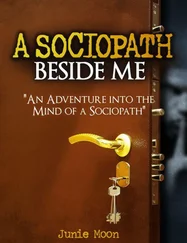There is a similar double standard currently applied to sociopaths versus sociopathic behavior. Sociopaths are prone to violence, but empaths also commit gruesome acts of violence. Those acts are more excusable to juries as long as the empath shows “remorse.” Jurors can self-identify with those who show remorse because they too may have also committed varying degrees of heinous acts while caught up in the moment that they later anguished over, swearing that they wish it had never happened. It’s harder for most people to understand someone who, while recognizing that it was a “bad” thing, went ahead and did it anyway. It’s hard for me to not see this as a unique form of hypocrisy to which “normal” people are particularly susceptible when attempting to condemn the behavior of others. Interestingly, once you get people alone, you get a different result. A recent experiment suggests that when single judges sentence sociopaths for whom there is evidence of genetic predisposition to violence and crime, they give lighter sentences than they otherwise would for the reasons that you would expect—sociopaths are less culpable because of their genetic predisposition to committing crimes. As a group, though, people are only a few mental steps away from a sociopath witch-hunt. While only a minority thinks that homosexuality should be criminalized, people have few qualms about unequal treatment of those diagnosed as “sociopaths.”
And so the majority goes on deciding what is “normal” and not, who is irredeemable or not, until one day you also get defined as abnormal. But if I look a lot like you, maybe it is because I am. We really should be friends, because if I can be marginalized in a democratic society, so can you. And once you also become a victim of the state, who do you think will be spearheading the revolution? Probably people like me.
One of my favorite parts about writing the blog is meeting strangers who are just like me, down to the most odd and intimate details. I want to accurately represent myself so that when they read the book, they will recognize themselves in my stories. I want to foster a sense of solidarity, a community of like-minded individuals who have a lot to learn from one another. In that way, writing this book has been calculated to achieve a particular effect. It’s difficult, though, without having the reader in front of me, to predict whether I have created that desired effect. Perhaps it’s like the difference between performing a piece of music to make an audio recording versus performing in front of a live audience. I am unable to gauge the reactions of book readers; I’m blind in a way that I am not accustomed to being. Even on the blog people will comment that they love things I thought were borderline pedantic and hate things that I thought were insightful. That’s the true weakness with my manipulations, that I don’t understand and never will truly understand the way normal people think—not my closest friends and family members and certainly not strangers, sociopaths or not. I can’t test-run a particular passage on myself to gauge how others will feel. I only can extrapolate from what I’ve learned in past experiences with normal people to try to make general predictions about what will and will not be effective. Writing the book is probably one of the most risky things I’ve done.
On my blog I actively obscure my identity. Google hosts my Web page. My domain name registration is anonymous. I use gender-neutral pronouns to describe myself. I use Britishisms when I can remember to do so. I have noticed that other sociopaths do this as well—there are several whom I know to be Americans who internationalize their language and their cultural references, the result perhaps of their natural instincts to obscure and befuddle. It’s not enough to try to keep your personal information out of reach. One must also actively poison the well with disinformation.
Only one person has come close to identifying me without my at least tacit permission. I learned a lot from that experience, and I cleaned up my act. I became more careful about who knew what about me and particularly paranoid about what personal information made it online, either under my persona as M.E. or my birth name.
When I decided to write this book, I thought a lot about what that would mean for my public life, the life where I’m not known as M.E. In that life, particularly up until starting the blog, almost no one knew that I identified as a sociopath. At that time, even I didn’t care about attaching a label to myself. When I finally decided to accept it and started the blog, I told my immediate family and a couple friends. Since then I’ve averaged telling about one or two people per year—typically when I have needed their experienced advice in a particular area, about writing, search engine optimization, legal, etc. Or I’ve just been dying to let them know of some horribly great thing I just managed to pull off, like crushing a bully at work or seducing someone just to ruin them. It can be lonely not having anyone to share your exploits with. About a year ago my mom decided to be open about me with her own siblings. I think she was sort of proud of me and what I have managed to accomplish with my blog and the positive effects on my life from all that self-introspection. There is a difference between being out to people who love you and have various incentives to want to keep you safe, though, and being out to the world.
I decided that if I were to write the book, I would want to be in a glass closet. I knew that I had to be more forthcoming than being totally anonymous; otherwise the book would have little legitimacy. Unless people believe my story, it will lose its effectiveness in terms of educating people and advocating on behalf of myself and others like me. But I also have a separate life and career. I wonder, would I be fired if my employers found this out about me? Not because I’m a bad employee or abusive to students, but just because of my diagnosis? If ever I were sent to jail, I could be denied parole solely based on a psychological profile. Depending on what I was in prison for and what jurisdiction I was in, I could be imprisoned indefinitely. It’s a big deal. Although I’m not really planning on becoming a felon any time in the next two years, my level of impulsivity makes that always a very real possibility. Will my friends, employers, or future love interests be able to see past these propensities and judge me solely based on what I have actually done, not just what I am capable of doing? Or will they always be scared that I’m not as under control as I claim to be?
And I have young children in my family. Maybe someday I will even have kids of my own. They share my name. This stigma could reach far past me to those innocents who never asked for it.
I don’t mind being an advocate, but I have no desire to be famous. To the extent that the cause needs a face, I don’t mind being that face. I don’t even mind showing my face. I know that it helps people and personalizes my message. I am a real person. I have a name. I don’t even mind your knowing my name. I know that secrets are too enticing, so I don’t want there to be any secret. If you’re dying to know my real name, please write to me and I’ll tell you. My contact information is on my website. The only thing I ask in exchange is that you not disclose my name. Keep it to yourself. Let others find out the same way you had to—directly from me, for themselves.
I’m hoping that this way we can all get what we want. You can find out anything you want to know about me, and my young relatives won’t have to grow up with people looking askance at them, wondering if they’re also genetically disposed to be monsters. Is it possible to remain in a glass closet in the information age? I’m actually curious to see if it works. Of course, it’s risky, but I have a pretty high tolerance for risk. If it does work, maybe I’ll write my next academic article on it.
Читать дальше












